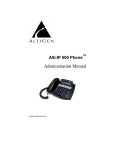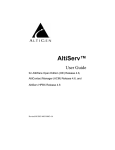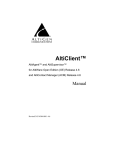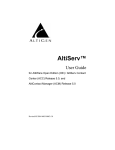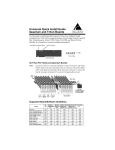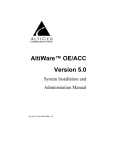Download Altigen Altiware OE 4.5 Specifications
Transcript
Alti-IP 600 Phone™ Administration Manual 12/2003 4290-0010 WARNING! Toll fraud is committed when individuals unlawfully gain access to customer telecommunication systems. This is a criminal offense. Currently, we do not know of any telecommunications system that is immune to this type of criminal activity. AltiGen Communications, Inc. will not accept liability for any damages, including long distance charges, which result from unauthorized and/or unlawful use. Although AltiGen Communications, Inc. has designed security features into its products, it is your sole responsibility to use the security features and to establish security practices within your company, including training, security awareness, and call auditing. NOTICE While every effort has been made to ensure accuracy, AltiGen Communications, Inc. will not be liable for technical or editorial errors or omissions contained within the documentation. The information contained in this documentation is subject to change without notice. This documentation may be used only in accordance with the terms of the AltiGen Communications, Inc. License Agreement. AltiGen Communications, Inc. 47427 Fremont Blvd. Fremont, CA 94538 Telephone: 510-252-9712 Fax: 510-252-9738 E-mail: [email protected] Web site: www.altigen.com TRADEMARKS AltiGen, AltiServ, AltiServ HPBX, AltiWare, AltiSpan, AltiReach, AltiLink, AltiConsole, AltiAdmin, Alti-IP 600, Zoomerang, and Dynamic Messaging are trademarks or registered trademarks of AltiGen Communications, Inc. All other brand names mentioned are trademarks or registered trademarks of their respective manufacturers. Copyright © AltiGen Communications, Inc. 1998-2003. All rights reserved. Printed in U.S.A. 12/2003 4290-0010 Contents Contents . . . . . . . . . . . . . . . . . . . . . . . . . . . . . . . . . . . . . . . . . . . i Warranty . . . . . . . . . . . . . . . . . . . . . . . . . . . . . . . . . . . . . . . . . . v Preface: About This Manual . . . . . . . . . . . . . . . . . . . . . . . . . ix CHAPTER 1 An Overview of the Alti-IP 600 . . . . . . . . . . . . . . . . . . . . . . . . 1 Hardware Components . . . . . . . . . . . . . . . . . . . . . . . . . . . . . . . . . . . 4 CHAPTER 2 System & Network Requirements . . . . . . . . . . . . . . . . . . . . . . 5 System Requirements . . . . . . . . . . . . . . . . . . . . . . . . . . . . . . . . . . . . 5 Network Requirements . . . . . . . . . . . . . . . . . . . . . . . . . . . . . . . . . . 5 AltiAdmin Configuration Requirements . . . . . . . . . . . . . . . . . . . . . 5 AltiGen IP Phone Service . . . . . . . . . . . . . . . . . . . . . . . . . . . . . . . . 6 Plug and Play Feature . . . . . . . . . . . . . . . . . . . . . . . . . . . . . . . . . . . 6 Basic Mode . . . . . . . . . . . . . . . . . . . . . . . . . . . . . . . . . . . . . . . . . . . 6 Normal Operation . . . . . . . . . . . . . . . . . . . . . . . . . . . . . . . . . . . . . . 6 CHAPTER 3 Installation . . . . . . . . . . . . . . . . . . . . . . . . . . . . . . . . . . . . . . . . . 7 Manual Setup . . . . . . . . . . . . . . . . . . . . . . . . . . . . . . . . . . . . . . . . . . 7 Plug and Play Setup . . . . . . . . . . . . . . . . . . . . . . . . . . . . . . . . . . . . 13 Plug and Play Setup Before IP Phone is Started. . . . . . . . . . . . . 13 Plug and Play Setup After IP Phone is Started . . . . . . . . . . . . . . 14 Remote Installation . . . . . . . . . . . . . . . . . . . . . . . . . . . . . . . . . . . . 15 Verifying the Phone Startup Process . . . . . . . . . . . . . . . . . . . . . . . 16 Resolving Errors Upon Startup . . . . . . . . . . . . . . . . . . . . . . . 17 Active Logon While Another Handset is Already Logged On To the Same Extension . . . . . . . . . . . . . . . . . . . . . . . . . . . . . . . . . . . . . 17 Restoring Default Settings . . . . . . . . . . . . . . . . . . . . . . . . . . . . . . . 17 Alti-IP 600 Administration Manual i Rebooting the Alti-IP 600 . . . . . . . . . . . . . . . . . . . . . . . . . . . . . . . Configuring “Phone Setting” Soft Keys . . . . . . . . . . . . . . . . . . . . Dialing an IP Number Directly from the Alti-IP 600 . . . . . . . . . . Operation Notes . . . . . . . . . . . . . . . . . . . . . . . . . . . . . . . . . . . . . . . 17 18 18 18 CHAPTER 4 Configuring Phone Settings . . . . . . . . . . . . . . . . . . . . . . . . . .21 System Settings . . . . . . . . . . . . . . . . . . . . . . . . . . . . . . . . . . . . . . . Network Settings . . . . . . . . . . . . . . . . . . . . . . . . . . . . . . . . . . . . . . Modifying DHCP Settings . . . . . . . . . . . . . . . . . . . . . . . . . . . . . . . Enabling DHCP . . . . . . . . . . . . . . . . . . . . . . . . . . . . . . . . . . . . . Disabling DHCP. . . . . . . . . . . . . . . . . . . . . . . . . . . . . . . . . . . . . Configuring IP Settings . . . . . . . . . . . . . . . . . . . . . . . . . . . . . . . . . Assigning a Local IP Address . . . . . . . . . . . . . . . . . . . . . . . . . . Assigning a TFTP Server . . . . . . . . . . . . . . . . . . . . . . . . . . . . . . Updating Phone Firmware . . . . . . . . . . . . . . . . . . . . . . . . . . . . . Resolving Errors Upon Startup . . . . . . . . . . . . . . . . . . . . . . . Configuring NAT . . . . . . . . . . . . . . . . . . . . . . . . . . . . . . . . . . . . . Assigning NAT . . . . . . . . . . . . . . . . . . . . . . . . . . . . . . . . . . . . . Setting Ring Tones . . . . . . . . . . . . . . . . . . . . . . . . . . . . . . . . . . . 21 22 23 23 23 24 24 24 25 26 26 27 27 CHAPTER 5 Phone Functions . . . . . . . . . . . . . . . . . . . . . . . . . . . . . . . . . . .29 Phone Functions . . . . . . . . . . . . . . . . . . . . . . . . . . . . . . . . . . . . . . 29 Appendix A . . . . . . . . . . . . . . . . . . . . . . . . . . . . . . . . . . . . . . .33 Specifications . . . . . . . . . . . . . . . . . . . . . . . . . . . . . . . . . . . . . . . . . Firewall Considerations . . . . . . . . . . . . . . . . . . . . . . . . . . . . . . . . . Troubleshooting . . . . . . . . . . . . . . . . . . . . . . . . . . . . . . . . . . . . . . . General Troubleshooting . . . . . . . . . . . . . . . . . . . . . . . . . . . . . . LCD Messages . . . . . . . . . . . . . . . . . . . . . . . . . . . . . . . . . . . . . . . . Local Menu Configuration Messages . . . . . . . . . . . . . . . . . . . . Alti-IP 600 Running Messages . . . . . . . . . . . . . . . . . . . . . . . . . IP Phone Boot Messages . . . . . . . . . . . . . . . . . . . . . . . . . . . . . . User Reference . . . . . . . . . . . . . . . . . . . . . . . . . . . . . . . . . . . . . . . Alti-IP 600 Administration Manual ii 33 34 35 35 38 38 39 40 41 Glossary . . . . . . . . . . . . . . . . . . . . . . . . . . . . . . . . . . . . . . . . . . 45 Index . . . . . . . . . . . . . . . . . . . . . . . . . . . . . . . . . . . . . . . . . . . . . 51 Alti-IP 600 Administration Manual iii Alti-IP 600 Administration Manual iv Warranty What The Warranty Covers AltiGen Communications warrants its hardware products to be free from defects in material and workmanship during the warranty period. If a product proves to be defective in material or workmanship during the warranty period, AltiGen Communications will, at its sole option, repair, refund or replace the product with a like product. How Long the Warranty Is Effective All AltiGen Communications products are warranted for one (1) year for all parts from the date of the first end user purchase. Whom the Warranty Protects This warranty is valid only for the first end user purchaser. What the Warranty Does Not Cover 1. Any product on which the serial number has been defaced, modified or removed. 2. Damage, deterioration or malfunction resulting from: a) Accident, misuse, neglect, fire, water, lightning, or other acts of nature, unauthorized product modification, or failure to follow instructions supplied with the product. b) Repair or attempted repair by anyone not authorized by AltiGen Communications. c) Any damage of the product due to shipment. d) Removal or installation of the product. e) Causes external to the product, such as electric power fluctuations or failure. f) Use of supplies or parts not meeting AltiGen Communications’ specifications. g) Normal wear and tear. h) Any other cause which does not relate to a product defect. Alti-IP 600 Administration Manual v 3. Shipping, installation, set-up and removal service charges. How to Obtain Service End user customers should contact your Authorized AltiGen Dealer for service. Authorized AltiGen Dealers must follow the steps below for service: 1. Take or ship the product (shipment prepaid) to your AltiGen distributor or to AltiGen Communications, Inc. All materials being returned to AltiGen must have an associated RMA number. RMA numbers are issued by AltiGen Customer Service and can be obtained by calling 1-888-ALTIGEN (258-4436) or faxing an RMA form, available from the AltiGen website at http://www.altigen.com/ partner/product.htm, to 510-252-9738, attention to Customer Service. AltiGen reserves the right to refuse return of any material that does not have an RMA number. The RMA number should be clearly marked on the outside of the box in which the material is being returned. For example: Attn.: RMA # 123 AltiGen Communications, Inc. 47427 Fremont Blvd. Fremont, CA 94538 Upon authorization of return, AltiGen will decide whether the malfunctioning product will be repaired or replaced. 2. To obtain warranty service, you will be required to provide: a) the date and proof of purchase b) serial number of the product c) your name and company name d) your shipping address e) a description of the problem. 3. For additional information contact your AltiGen Dealer or AltiGen Communications, Inc. via e-mail at [email protected]. vi Alti-IP 600 Administration Manual Effect of State Law This warranty gives you specific legal rights, and you may also have other rights which vary from state to state. Some states do not allow limitations on implied warranties and/or do not allow the exclusion of incidental or consequential damages, so the above limitations and exclusions may not apply to you. Sales Outside the U.S.A. For AltiGen Communications products sold outside of the U.S.A., contact your AltiGen Communications dealer for warranty information and services. Alti-IP 600 Administration Manual vii viii Alti-IP 600 Administration Manual Preface: About This Manual This document provides the required steps to get the Alti-IP 600 phone up and running on a Voice over IP (VoIP) network. For complete and detailed information on procedures that you need to perform on AltiGen’s AltiWare application or other network devices, refer to the AltiWare OE 4.6 System Installation and Administration Manual. Another document, the Alti-IP 600 Quick Reference Card, covers basic end user phone features and AltiServ functions such as call handling, voice mail, and web interface. This guide contains the following chapters and appendices: Chapter 1, An Overview of the Alti-IP 600, provides an overview and description of the Alti-IP 600. Chapter 2, System and Network Requirements describes configuration requirements. Chapter 3, Installation, describes how to properly install the Alti-IP 600, how to configure network settings, and operation notes. Chapter 4, Configuration, describes how to configure phone settings for the Alti-IP 600. Chapter 5, Phone Functions, provides on overview of the Alti-IP 600 basic functions. Appendix A, provides phone specifications, tips for troubleshooting the Alti-IP 600, LCD message information and user reference information. Glossary Index Overview The Alti-IP 600 Administration Manual provides information about how to set up, connect cables to, and configure an Alti-IP 600 phone. It also provides information on how to configure the network and IP settings, and how to change the settings and options of the Alti-IP 600 phone. The administrator guide also includes reference information such as IP phone call flows and compliance information. Alti-IP 600 Administration Manual ix Related Documentation • Alti-IP 600 Quick Reference Card • AltiWare OE 4.5 System Installation and Administration Manual • AltiWare OE 4.5A Supplement x Alti-IP 600 Administration Manual CHAPTER 1 An Overview of the Alti-IP 600 The Alti-IP 600 is an H.323-compliant, business telephone that provides voice communication over an IP network. The Alti-IP 600 provides functionality similar to traditional analog phones, including automatic redial, on-hook dialing, hands-free operation, 10 programmable keys and LCD display. The main components of the phone are illustrated below (Figure 1) and defined in the following table. 2 3 4 1 5 6 7 19 8 9 18 10 17 16 15 14 11 13 12 Figure 1. Alti-IP 600 Alti-IP 600 Administration Manual 1 4 3 2 Figure 2. Alti-IP 600, Top View 1 LCD Screen Multi-use: displays features such as time, phone number, caller ID, call waiting, line/call status and call time. 2 PC Access Port Connects to PC (10/100 PC) 3 Network Port Connects to network (10/100 SW) 4 AC Adapter Port Connects to power outlet. 5 Soft Keys 1-10 10 soft keys can be configured as a BLF (Busy Lamp Field) key, an AltiServ feature code, a speed dial key, or a phone setting key, set up by the System Administrator in AltiAdmin. Note: The lower left Soft Key is set up as FLASH by default. This can be re-assigned in AltiAdmin (AltiGen IP Phone Configuration). The phone setting key, once set up by the system administrator, can be configured as a feature code or speed dial key directly from the user’s IP Phone using * * 6 ENTER. Alti-IP 600 Administration Manual 2 6 Volume Increases/decreases volume of ringer, speaker and handset/headset. 7 Navigation keys !/"(UP/DOWN keys) allow you to scroll through text and select features displayed on the LCD screen. #(FORWARD key) is for menu selection. $(BACK key) returns to previous configuration menu or deletes the last digit input. 8 ENTER Finishes input for menu selection. 9 REDIAL Redials up to last 16 calls and up to 32 digits. 10 SPK/MUTE Enables speaker or mute. 11 VM Voice mail access button. Note: When a voice mail is deleted, the number of voice mails displayed on the LCD will not be updated until the next call is finished. 12 Main Indicator Light Slow blink when holding, mute or message waiting; fast blink for ringing; always on when on speaker phone. 13 Dial Pad Functions exactly as a dial pad on a traditional telephone 14 RELEASE Releases a call. 15 ICOM* Incoming voice path through speaker, indicated by the button’s blinking indicator light. 16 CONF* Initiates a conference call, indicated by the button’s blinking indicator light. 17 XSFR* Transfers a call, indicated by the button’s blinking indicator light. 18 HOLD* Places a call on hold, indicated by the button’s blinking indicator light. Alti-IP 600 Administration Manual 3 19 Note: Receiver Jack Connects to receiver. * indicates a normal operating mode key feature, which is only available after registering the Alti-IP 600 with the phone server and logged in as an extension. Hardware Components The following hardware items are included in this package: • Alti-IP 600 Set • Phone receiver • AC Adapter (Input: 100-240V; Output: DC 5V, 2A) • Power cord • Network cable Alti-IP 600 Administration Manual 4 CHAPTER 2 System & Network Requirements System Requirements • AltiWare OE 4.5A IP-PBX or higher Note: A lower version of AltiWare may cause the IP phone to lose several advanced features, resulting in use as a very basic H.323 phone. • AltiGen OE 4.5A Gatekeeper (to support Plug and Play functionality) Network Requirements • Network connection — the IP phone must have TCP/IP connection to the related AltiWare OE 4.5A or higher. • DHCP Server (to get dynamically IP address when necessary) • TFTP Server (to update the IP phone firmware when necessary) • GATEKEEPER (for Plug and Play feature) AltiAdmin Configuration Requirements • The Alti-IP 600 requires a virtual extension to be created as an IP extension in AltiAdmin to handle call processing. Refer to the AltiWare OE 4.5A Supplement and the “Setting Up IP Extensions” chapter in the AltiWare OE 4.5/4.6 or ACM 4.6 System Administration Manual for detailed instructions on how to set up an IP Extension to manage the IP phone. • The IP Phone settings must be pre-configured in AltiAdmin before setting up configuration for the Alti-IP 600. Alti-IP 600 Administration Manual 5 AltiGen IP Phone Service Introduced in AltiWare OE 4.5A, AltiGen IP Phone Service is installed together with AltiServ, runs on the same system as AltiServ, and connects to AltiServ through enhanced AltiLink+ protocol on behalf of Alti-IP 600 phones. This service must be running for the Alti-IP 600 to operate. If IP Phone Service stops while the Alti-IP 600 is on a call, the call will be disconnected. Plug and Play Feature The Alti-IP 600 supports a plug and play feature when running AltiWare. When the phone is first booted up, this feature will enable the phone to automatically register itself to AltiServ, instead of having to program the phone manually. Refer to “Configuring Startup Network Settings” on page 12 for requirements and setup. Note: The Plug and Play feature requires AltiGateKeeper Discovery and a single gatekeeper on the LAN. Basic Mode The Alti-IP 600 operates in Basic mode if it fails to register with AltiWare during the startup mode. When in basic mode, the IP Phone’s LCD display shows “(BASIC) IDLE”. No AltiWare switching features are available in this operating mode. However, the phone user can enter a destination IP address followed by #, and make an outgoing call through the IP network to reach AltiWare or another Alti-IP 600 phone. Also, the IP phone can accept incoming calls originating from AltiWare or another Alti-IP 600 phone. Normal Operation In normal operating mode, the Alti-IP 600 should have been registered with the phone server and logged in as an extension. The time and extension appear in the LCD screen and all phone features are enabled. Note: To make the Alti-IP 600 work in normal operating mode, open the firewall port 10032 for the phone server. Refer to the AltiWare OE 4.5A Supplement or AltiWare OE 4.5/4.6 or ACM 4.6 System Administration Manual for information on other firewall ports for H.323. Alti-IP 600 Administration Manual 6 CHAPTER 3 Installation These steps describe procedures for installing and configuring the Alti-IP 600 locally — through manual setup or plug and play. To install and configure the phone remotely, refer to “Remote Installation” on page 15. Manual Setup To manually set up the Alti-IP 600 phone, perform the following steps: 1. Network Setup Find out the settings for the following (this information will be needed later to configure the Alti-IP 600): • AltiWare Server IP Address • DHCP - if DHCP is not used, obtain the Alti-IP 600 phone’s IP address from the System Administrator. • Gatekeeper Auto Discovery - if gatekeeper auto discover is not used, obtain the AltiWare IP address. • Firewall - Refer to “Firewall Considerations” on page 34. 2. AltiAdmin/ACM Admin Setup - AltiGen IP Phone Configuration Window To configure the Alti-IP 600 phone with AltiAdmin/ACM Admin, select AltiGen IP Phone Configuration from the Management menu. Alti-IP 600 Administration Manual 7 This opens the AltiGen IP Phone Configuration window where, after setting up an IP extension, you can set the following parameters for the IP extension: Alti-IP 600 Administration Manual 8 The left side of the IP Phone Configuration window displays all the Alti-IP phone extensions that have been set up in the system. After creating the IP extensions, you can set the following parameters: Parameter Description Soft Key 1 - 10 Corresponds to the 10 soft keys on the Alti-IP 600. Use the drop down list to assign one of the following functions to the desired keys: • Disabled - when selected, the corresponding soft key cannot be used. • BLF (Busy Lamp Field) - when selected, enter an extension number in the field below; this will be associated with the corresponding soft key to automatically dial this extension number; the button light next to this soft key indicates that the extension number is busy. You can select the Play Beep Tone check box to also have the IP phone play an audible beep when the extension number is ringing. Note: The BLF feature can only be used for internal extension numbers, not outside numbers. • Feature Code - when selected, enter an AltiServ feature code in the field below; this will be associated with the corresponding soft key to dial this feature code. • Speed Dial - when selected, enter the speed dial code in the field below; this will be associated with the corresponding soft key to dial this speed dial code. • Phone Setting - when selected, the IP phone user will be able to program the corresponding soft key, as a speed dial or feature code key, directly from the IP phone (using * * 6, then ENTER). Note: Upon initial installation, the lower left soft key is set up as FLASH by default. This key can be re-assigned in the AltiGen IP Phone Configuration window. No other soft keys can be configured to FLASH. All other soft keys are initially defaulted to Phone Setting. Alti-IP 600 Administration Manual 9 Parameter Description General Allows you to specify the IP address of the AltiServ system the Alti-IP 600 phone is connected to. The version of software associated with AltiServ is automatically displayed in the Version field. To allow the extension user to have password-protected configuration functionality from the phone itself, check the Enable Config Password checkbox and assign a numerical password. When the extension user attempts to configure features, the user will need to enter the assigned password to proceed. H.323 Allows you to set the Jitter Buffer in milliseconds, the delay used to buffer voice packets received from the IP network. The Jitter Buffer should be adjusted according to the WAN bandwidth allocated to data traffic. To allow NAT support for the IP extension, check the Enable NAT button and enter the public IP address of the NAT router. TFTP Allows you to assign the TFTP Server to which the IP phone can connect to for updating firmware when necessary. Enter the IP address of the TFTP Server in the Server field. Check the Reset IP Phone and Boot Download checkbox options to reset or reboot the phone, respectively. Debug When enabled, allows the Alti-IP 600 phone to connect to Telnet for debugging. Important:When updating the Alti-IP 600 phone’s firmware, it is recommended that administrators perform any updates after normal business hours or when the IP phone is not in use. If the Alti-IP 600 phone is in use during an update, the call will be disconnected. Alti-IP 600 Administration Manual 10 Notes: • IMPORTANT! Please note that the configuration in AltiWare will override the Alti-IP 600 phone’s local configuration after the IP Phone is registered. If the IP phone’s local configuration is changed while in Basic mode, these changes will be overwritten by AltiAdmin/ACM Admin settings. Also, after the IP Phone is successfully registered with the system, the IP phone will overwrite the AltiWare IP address and network-related settings on the server. • IMPORTANT! When updating the Alti-IP 600 phone’s firmware, it is recommended that administrators perform any updates after normal business hours or when the IP phone is not in use. If the AltiIP 600 phone is in use during an update, the call will be disconnected. • The Apply To button works with the following parameters: General, H.323, TFTP (Server field only; Reset IP Phone and Boot Download options cannot be applied to multiple extensions), and Debug. • This only works when the Alti-IP 600 is operating in basic mode. 3. Set Up Alti-IP 600 Connections You must connect the Alti-IP 600 to the network and to a power source before using it. Notes: • When the Alti-IP 600 is booted up without the PC port plugged in, the PC port defaults to 10Mbps. • If the PC port is to be used, the user should plug in both the LAN port and PC port before the IP phone is booted. • The user should reboot the Alti-IP 600 under any of the following conditions: — after disconnecting the LAN cable to the phone — after changing the IP address or DHCP setting — after rebooting the PC Note: If the PC is rebooted during a connected call, the voice path will be interrupted for 4-5 seconds to reinitialize the TCP/IP protocol stack. Alti-IP 600 Administration Manual 11 To connect the Alti-IP 600: a. Connect an Ethernet cable from the IP-PBX to the network port on the phone. b. Connect the handset to the receiver jack. c. Connect an Ethernet cable from another network device, such as a desktop computer, to the access PC port on the phone. d. Connect the power plug to the AC Adapter port. 4. Configuring Startup Network Settings If you are using DHCP, you do not need to configure anything. Proceed to Step 5. If you are not using DHCP, you must configure these network settings on the Alti-IP 600 after installing the phone on the network: • Local IP address • IP subnet mask • Default gateway IP address 5. Configuring the AltiWare IP Settings If you are using Gatekeeper Auto Discovery, you do not need to configure anything. Proceed to Step 6. If you are not using Gatekeeper Auto Discovery, you must manually configure the AltiWare IP address setting into the Alti-IP 600. Refer to “Configuring IP Settings” on page 24. 6. Activate the IP Extension Once the device is initialized, the user must follow these steps to activate the IP Extension. Note: The user must be running AltiGen’s Gatekeeper service for full functionality. a. With the handset onhook, press # 27, then the ENTER button. b. Enter your extension number and password when prompted. c. The phone will attempt to register as shown in the LCD screen. Alti-IP 600 Administration Manual 12 If the phone successfully passes through these stages, the phone shows the time and extension in the LCD screen and is now in normal operating mode. Otherwise, refer to “Troubleshooting” on page 35. Plug and Play Setup The steps for plug and play setup will vary depending on whether or not the Alti-IP 600 Phone has been started. When the Alti-IP 600 is started for the first time, it can support plug and play to enable the phone to automatically register itself to AltiServ. If the Alti-IP 600 has already been started, follow the instructions “Plug and Play Setup After IP Phone is Started” on page 14. Important Notes: • To use the Plug and Play feature, the user’s IP Phone must be on the local LAN with AltiServ • There can only be one (1) AltiServ on the LAN. • Gatekeeper auto discovery uses broadcast UDP packets which work in the LAN or VPN environment, but not through the public IP network. Plug and Play Setup Before IP Phone is Started To set up your IP Phone to properly execute the Plug and Play feature, perform the following steps BEFORE YOU START THE PHONE: 1. Ensure the AltiGen GateKeeper is running and configured to point to the AltiWare system. 2. Ensure DHCP server is up and running. 3. Ensure that there are enough IP addresses. 4. Ensure that there is an available virtual extension with the IP extension feature enabled and dynamic IP address is selected. 5. Power up the IP Phone. 6. Enter the extension number and password. Alti-IP 600 Administration Manual 13 7. The phone will attempt to register as shown in the LCD screen. If the phone successfully passes through these stages, the phone shows the time and extension in the LCD screen and is now in normal operating mode. Otherwise, refer to “Troubleshooting” on page 35. 8. If you wish to change soft keys, you can set up IP Phone properties in AltiWare as described in Step 2 - “AltiAdmin/ACM Admin Setup AltiGen IP Phone Configuration Window” on page 7. Plug and Play Setup After IP Phone is Started If you have already started your phone, and wish to execute the Plug and Play feature, perform the following steps: 1. Power up the IP phone (the phone should be in basic mode). 2. Press * * 7 + ENTER to go to the IP phone configuration menu. 3. Press * * 2 + ENTER to restore default settings. 4. Reboot the phone (by unplugging the power and replugging OR pressing $(BACK key) until in Basic mode. The IP phone will automatically go to normal operating mode after reboot. 5. Enter extension number and password. 6. The time and extension is displayed in the LCD screen after the phone has been successfully logged on to AltiServ. Alti-IP 600 Administration Manual 14 7. Set up IP Phone properties in AltiWare as described in Step 2 “AltiAdmin/ACM Admin Setup - AltiGen IP Phone Configuration Window” on page 7. 8. Setup is complete. For further configuration of settings for the Alti-IP 600, refer to “Configuring Phone Settings” on page 21. Remote Installation To install the Alti-IP 600 at a remote location, using a DSL connection with or without a router hub: 1. Check the firewall settings at the corporate network to open TCP/UDP ports required by the Alti-IP 600. (For more information on firewall settings, refer to “Firewall Considerations” on page 34.) 2. Check the AltiWare server’s IP extension settings (make sure the IP extension is enabled, enough IP licenses are available, etc.) 3. Press * * 7 ENTER on the Alti-IP 600 phone to configure the phone’s local IP address and Gateway IP address. (Depending on the DSL provider’s recommendations, you may or may not want to use DHCP.) 4. Configure the Alti-IP 600 phone’s AltiWare address. 5. If NAT server is used, access NETWORK settings in the configuration menu. Change ENABLE NAT setting to YES and assign the NAT server’s public IP address in the NAT Address setting. 6. If configuring with an H.323 NAT router, the NAT router can forward IP traffic to a specified private IP address based on the destination port in the TCP/IP or UDP packets. When an H.323 endpoint is behind the H.323 NAT, you should set up the forwarding to a private IP address of this H.323 endpoint. If this H.323 endpoint is AltiWare, the NAT router must be configured to forward to following ports to the H.323 endpoints private IP address: • TCP port 10032 (for phone service) • TCP port 1720 (for H.225) • TCP/UDP 49152 ~ N (for H.245 and RTP/RTCP); where N = 49152 + (62 * number of VoIP boards) - 1. 7. Use #27 + ENTER to initiate logging onto AltiServ. Alti-IP 600 Administration Manual 15 8. The phone will attempt to register as shown in the LCD screen. If the phone successfully passes through these stages, the phone shows the time and extension in the LCD screen and is now in normal operating mode. Note: The Alti-IP 600 AltiWare IP address, TFTP (IP) address and other network related configuration parameters will override the AltiAdmin’s settings when the phone registers with AltiServ. Other parameters will still be overridden by the AltiAdmin settings as before. Otherwise, refer to “Troubleshooting” on page 35. 9. Set up IP Phone properties in AltiWare as described in Step 2 “AltiAdmin/ACM Admin Setup - AltiGen IP Phone Configuration Window” on page 7. Verifying the Phone Startup Process After the Alti-IP 600 has power connected to it, the phone begins its automatic booting process by cycling through these steps: 1. All LED lights will be on. 2. The LCD screen displays [ATGN BOOT] on the first line. 3. On the second line of the LCD screen, the following messages are displayed in succession: — CHECK MEMORY (RAM checking state) — CHECK FW (Firmware checking state) — BOOTING NOW (Initialization of hardware - LCD, network, DSP, etc.) — INITIALIZING Alti-IP 600 Administration Manual 16 Resolving Errors Upon Startup If an error occurs during booting, the LED light of Soft Keys 1 through 4 will remain on to indicate an error status. These errors represent hardware failures within the IP Phone. • LED 1 light on = memory check failed • LED 2 light on = network failed • LED 3 light on = DHCP failed • LED 4 light on = attached IP address failed If the phone successfully passes through these stages, it has started up properly. Otherwise, refer to “Troubleshooting” on page 35. Active Logon While Another Handset is Already Logged On To the Same Extension If another analog phone or IP phone is already logged on to the same extension, rebooting the Alti-IP 600 will not register the phone successfully. The user must press #26 on the associated physical phone/IP phone, then on the IP phone, use #27 + ENTER to actively log onto AltiServ. Once the extension is logged on and activated, the calls will then be redirected to this IP Phone. Important:Also, the user should not use the VM option to logon the Alti-IP 600. Restoring Default Settings To automatically restore the original default settings for the Alti-IP 600: 1. Press * * 7, then press the ENTER button 2. Press * * 2, then press the ENTER button. Rebooting the Alti-IP 600 To reboot the Alti-IP 600, press * * 3, then press the ENTER button. Note: When the Alti-IP 600 is rebooted, the AltiWare IP address setting is set back to the original configuration. Alti-IP 600 Administration Manual 17 Configuring “Phone Setting” Soft Keys When the soft key is set to “Phone Setting” (in the IP Phone Configuration window of AltiAdmin), the IP Phone user can configure the soft key to store a speed dial number or feature code. To configure a soft key with phone setting enabled: 1. Press * * 6, then the ENTER button. 2. Scroll to the program key to configure. 3. Enter the appropriate digits for the speed dial number or feature code. The digits will be automatically dialed when this function key is pressed. Dialing an IP Number Directly from the Alti-IP 600 To dial an IP number directly from the Alti-IP 600 phone set, enter the IP address using the * key to enter periods followed by the # key. Notes: • This only works when the Alti-IP 600 is operating in basic mode. • If the Alti-IP 600 is configured for a public IP address, you can call other public IP address devices. If the Alti-IP 600 is configured for a private IP address, you can call other private IP address devices that you can “see” or that are on your subnet. Operation Notes • The Alti-IP 600 does not work with TAPI as the source phone (caller). • When using #26 and #27 to log out/in, the Alti-IP 600 must be onhook. Using the speaker button to use #26 or #27 will not work. • Two dial tones are always heard when going offhook on the Alti-IP 600. • If two calls ring into the Alti-IP 600 at the same time and the user attempts to answer the second call, the IP phone will automatically connect the user to the first call. Alti-IP 600 Administration Manual 18 • The user should reboot the Alti-IP 600 after disconnecting the LAN cable to the phone. • The user should reboot the Alti-IP 600 after changing the IP address or DHCP setting. • If the Alti-IP 600 is configured for a public IP address, you can call other public IP address devices. • If the Alti-IP 600 is configured for a private IP address, you can call other private IP address devices that you can “see” or that are on your subnet. • The daisy chaining of Alti-IP 600 phones is not supported. Alti-IP 600 Administration Manual 19 Alti-IP 600 Administration Manual 20 CHAPTER 4 Configuring Phone Settings A set of phone related parameters — system settings and network settings — can be configured through the IP phone’s setup menu by pressing “* * 7,” then the ENTER button. !/"(UP/DOWN keys) selects YES or NO in the LCD display. #(FORWARD key) selects menu. $(BACK key) returns to previous menu. The following tables describe each setting and corresponding the menu path. Important:Please note that the configuration in AltiAdmin will override the Alti-IP 600 phone’s local configuration after the IP Phone is registered. If the IP Phone’s local configuration is changed while in Basic mode, these changes will be overwritten by AltiAdmin settings. Also, after the IP Phone is successfully registered with AltiServ, the IP Phone will overwrite the AltiWare IP address and network-related settings on the server. Note: Several of these settings can be configured through AltiAdmin by the System Administrator. System Settings Setting Menu Path {Sub Menu} Description Extension Number System>Ext Number {Set IP Extension Number} Sets the IP phone’s extension number Extension Password System>Ext Password {Set IP Extension Password} Sets the IP phone’s extension password AltiWare Server System>AW Server {AltiWare IP Address} Sets the AltiWare server’s IP address Alti-IP 600 Administration Manual 21 TFTP Server System>TFTP Server {Save TFTP Server IP Address} Sets the TFTP server IP address for updating firmware. Boot Download System>Boot Download After firmware image upgrade, submenu changes to {No}. Used mainly for upgrading or troubleshooting. On the next boot, the phone will download the new firmware from the TFTP server, if set to [YES]. Note: Make sure to launch TFTP32.exe. When downloading, the phone key pad is disabled. Version Information Indicates the version number of the IP Phone. System>Version Info {Read only, version information} Network Settings Setting Menu Path {Sub Menu} Description Enable DHCP Network>Enable DHCP Set YES or NO to indicate whether Dynamic Host Configuration Protocol (DHCP) is being used by the IP phone to retrieve new IP address upon boot up. Local Address Network>Local Address Sets the IP phone’s local address; only shows if DHCP is disabled. Network Mask Network>Network Mask Sets the IP phone’s network mask; only shows if DHCP is disabled. Gateway Network>Gateway Sets the Gateway IP address. Enable Gatekeeper Network>Enable/ Disable GateKeeper Set whether GateKeeper is enabled or disabled. Alti-IP 600 Administration Manual 22 GateKeeper Discovery Network>GK Discovery Set to YES or NO to indicate whether GateKeeper discovery is enabled. IP Phone will automatically find GateKeeper. Enable NAT Network>Enable/ Disable NAT Set whether NAT is enabled or disabled. NAT Address Network>NAT Address Sets the NAT server’s public IP address. Modifying DHCP Settings Dynamic Host Configuration Protocol (DHCP) automatically assigns IP addresses to devices when they are connected to the network. Enabling DHCP The Alti-IP 600 automatically enables DHCP by default, but you can reset the protocol if it becomes disabled using the following steps: 1. Press * * 7 + ENTER button. 2. Use !/" to select Network, then press the Enter key. 3. Scroll to Enable DHCP. If DHCP is disabled, the option displays as DHCP Enabled NO. 4. Press " (DOWN key) to enable DHCP. Disabling DHCP If you do not use DHCP in your network, you can disable DHCP before manually assigning an IP address to the Alti-IP 600. To disable DHCP, use the following steps:. Note: Procedures involving configuring IP settings cannot be completed when DHCP is enabled in your network. 1. Press * * 7 + ENTER button. 2. Use !/" to select Network, then press the Enter key. 3. Scroll to Enable DHCP. If DHCP is enabled, the option displays as DHCP Enabled YES. Alti-IP 600 Administration Manual 23 4. Press " (DOWN key) to disable DHCP. Configuring IP Settings Use these guidelines when manually configuring the IP settings: • Ensure the default gateway IP address in on the same subnet as the host IP address. • When inputting IP addresses into the Alti-IP 600, use the * key to enter periods. For example, “209.120.12.8” would be inputted as “209*120*12*8”. Assigning a Local IP Address The IP address is the unique logical address identifying each host computer on a TCP/IP network. An IP address is a 32-bit number expresses as four decimal numbers from 0 to 255 separated by periods. To assign an IP address, use the following steps: 1. Press * * 7 + ENTER button. 2. Use !/" to select Network, then press the ENTER button. 3. Scroll to Local Address. 4. Press the ENTER button or#(FORWARD key). 5. Use the buttons on the dial pad to enter a new IP address, using the * key to enter periods. Use the $(BACK key) to correct any mistakes. 6. Press the ENTER button. Assigning a TFTP Server The default TFTP Server is set to 0.0.0.0. To assign the TFTP server, use the following steps: 1. Press * * 7. 2. Use !/" to select System, then press the ENTER button. 3. Scroll to TFTP Server. 4. Press ENTER button or#(FORWARD key). Alti-IP 600 Administration Manual 24 5. Use the buttons on the dial pad to enter the new TFTP server address, using the * key to enter periods. Use the $(BACK key) to correct any mistakes. 6. Press the ENTER button. Updating Phone Firmware Note: If using TFTP Server Application, TFTPD32, included in the CDROM, copy the following files — tftpd32.exe and <hlp> files —to your local directory; once copied, you can launch the TFTP Server application from the executable file. Obtain app_mid.bin and dsp.bin files from the AltiGen website and copy to your local directory. Important:When updating the Alti-IP 600 phone’s firmware, it is recommended that administrators perform any updates after normal business hours or when the IP phone is not in use. If the Alti-IP 600 phone is in use during an update, the call will be disconnected. You must have a TFTP server to have the Alti-IP 600 to connect to in order update the firmware. If the Alti-IP 600 phone is registered with AltiServ, to update the phone firmware from AltiAdmin: 1. Launch IP Phone Configuration in AltiAdmin Main Menu. 2. Set TFTP Server address. 3. Select Boot Download and Reset IP Phone check boxes, then click Apply. 4. The Alti-IP 600 should reboot and download image from the specified TFTP server. To update the phone firmware directly from the Alti-IP 600 Phone: 1. Press * * 7, then press the ENTER button to access the Configuration Menu. 2. Use !/"to scroll to System >TFTP Server. 3. Enter TFTP server address. 4. The Alti-IP 600 will download the firmware from the TFTP on the next reboot. Alti-IP 600 Administration Manual 25 5. Once the IP Phone is rebooted, all LED lights will be on. 6. The LCD screen displays [ATGN BOOT] on the first line. 7. On the second line of the LCD screen, the following messages are displayed in succession: — CHECK MEMORY (RAM checking state) — CHECK FW (Firmware checking state) — BOOTING NOW (Initialization of hardware - LCD, network, DSP, etc.) — INITIALIZING — update APP(S1-S5) 8. You may verify the new version of firmware in the phone’s configuration menu (* * 7 ENTER, then scroll to System>Version Info). Resolving Errors Upon Startup If an error occurs during rebooting, the LED light of Soft Keys 1 through 4 will remain on to indicate an error status. These errors represent hardware failures within the Alti-IP 600. • LED 1 light on = memory check failed • LED 2 light on = network failed • LED 3 light on = DHCP failed • LED 4 light on = attached IP address failed If the phone successfully passes through these stages, it has started up properly. Otherwise, refer to “Troubleshooting” on page 35. Configuring NAT NAT (Network Address Translation) is the translation of an IP address used within one network to a different IP address known within another network. One network is designated as the inside network, the other is the outside. The Alti-IP 600 can be enabled to support H.323 behind NAT. The Alti-IP 600 will be able to work behind a regular NAT router without any special implementation for H.323. For more detailed information regarding NAT configuration guidelines and implementation, refer to the AltiWare OE 4.5A Supplement. Alti-IP 600 Administration Manual 26 Note: If more than one Alti-IP 600 phone sits behind NAT, a VPN tunnel is required to connect between the NAT router and the corporate router. Assigning NAT By default, NAT is not enabled. If you connect the Alti-IP 600 behind a NAT router, you may manually assign the NAT router’s public IP address to this field. To assign the NAT address, use the following steps: 1. Press * * 7 + ENTER button. 2. Use !/" to select Network, then press the ENTER button. 3. Scroll to Enable NAT. 4. Press " (DOWN key) to select YES. 5. Press the ENTER button. 6. Use $(BACK key) to return to the Network menu, then select NAT Address. Use the buttons on the dial pad to enter the new NAT address, using the * key to enter periods. Use $(BACK key) to correct any mistakes. 7. Press the ENTER button. Setting Ring Tones The Alti-IP 600 Phone has three (3) ringing tones available. To set the ring tone: 1. Press * * 6 ENTER. 2. Scroll to SELECT RING and press ENTER or #(FORWARD key). 3. Scroll to desired ring tone (0-2), or press 0, 1 or 2 on the dialing pad, then press ENTER. Alti-IP 600 Administration Manual 27 Alti-IP 600 Administration Manual 28 CHAPTER 5 Phone Functions The Alti-IP 600 provides a broad range of call handling and dialing features directly on the phone and through AltiServ. The following section lists the supported telephony features, a brief description and additional configuration notes where applicable. Phone Functions Feature Description Configuration Notes Busy Lamp Field (BLF) Associates Soft Key with an extension that can be automatically dialed when selected; the corresponding button light indicates that the extension is busy and blinks when ringing. • From AltiAdmin, go to AltiGen IP Phone Configuration on the Management Menu, go to the desired extension, and set the appropriate function key to BLF and enter the extension in the field below. Select the Play Beep Tone checkbox to have the IP Phone play an audible beep when the extension is ringing. Conference Initiates a conference and adds in other parties one at a time. • Feature does not require special configuration to work. Signals PBX that special instructions will follow. • By default, the lower left Soft Key is set up as FLASH. This can be re-assigned in AltiAdmin through the AltiGen IP Phone Configuration window. Only this key can be configured as FLASH. (CONF) Flash Alti-IP 600 Administration Manual 29 Hold Places an active call on hold. • When multiple Call Waiting Feature is enable at the extension, the use can put multiple incoming calls on hold and retrieve using the phone’s !/"(UP/DOWN keys) and ENTER button. • Pressing HOLD while onhook will retrieve last hold call. • Supports up to 9 hold calls. Intercom Connects you directly to the callee’s intercom after exactly one ring. • Feature does not require special configuration to work. Mute While on a call, mutes conversation. • Feature does not require special configuration to work. Program Soft Keys Associates Soft Key with a speed dial number or feature code that can be configured directly on the IP Phone. • Go to AltiGen IP Phone Configuration on the Management Menu, go to the desired extension, and set the appropriate function key to Phone Setting. The user will be able to configure this key directly from the IP Phone by pressing * * 6 ENTER. Redial Redials the last number dialed. • Feature does not require special configuration to work. (ICOM) • Redials up to last 16 calls. • Redials up to 32 digits. Release Releases a call from the connected state. • Feature does not require special configuration to work. Ring Tones Select from one of three ring tones. • Press * * 6 ENTER, scroll to SELECT RING, and select from 0 - 2. Alti-IP 600 Administration Manual 30 Soft Keys Quickly performs a specified function (Busy Lamp Field, AltiServ Feature Code, Phone Setting or Speed Dial) previously configured by the System Administrator. (Soft key #6 is configured as FLASH by default. All other soft keys are set to Phone Setting by default.) • In AltiAdmin, go to Extension Configuration >Station Speed and enter the Speed Dial entries for the appropriate extension(s). Then, go to AltiGen IP Phone Configuration on the Management Menu, go to the desired extension, and set the appropriate soft key to the desired function (BLF, Feature Code, Phone Setting, Speed Dial). Speaker Enables use of speaker phone. • Feature does not require special configuration to work. Speed Dial Quickly dials a specified number that has been previously stored. • In AltiAdmin, go to Extension Configuration >Station Speed and enter the Speed Dial entries for the appropriate extension(s). Then, go to AltiGen IP Phone Configuration on the the Management Menu, go to the desired extension, and set the appropriate function key to Speed Dial and enter the speed dial code in the field below. Transfer Transfers an active call to another number. • Feature does not require special configuration to work. 1 - 10 (XSFR) • You cannot use this button to “flash” after using it to transfer a call. If you want to reconnect to a call after using the XSFR button, you must use the $(BACK key). Voice Mail (VM) Enables access to voice messages. • The VM count that appears in the LCD displays new messages (previously heard messages are not included). Alti-IP 600 Administration Manual 31 Alti-IP 600 Administration Manual 32 Appendix A Specifications Network Protocols • H.323, RTP, RTCP, TFTP, TCP, UDP, DHCP, DNS, ARP, ICMP, Telnet Call Control Protocols • H.323 Audio Standards • Vocoder: ITU G.711 (PCM), one low bit rate (G.723.1) Keypad Features & Handset • 12 standard dialing keys: 0-9, *, # • Acoustic Echo cancellation supporting high-quality speakerphone • 6 Feature keys: Redial, Voicemail, Intercom, Conference, Transfer, Hold. • 10 Function keys: can be set to Busy Lamp Field, AltiServ feature code, speed dial or flash. • Adjustable Speaker/Ring/Handset volume control LCD • 2 x 16 Character LCD Display • Provide features such as time, calling party name, calling party number, digits dialed, extension number, number of new voice mails, DND/FWD and system information. LED • Hold, Mute, Speaker, Conference, Forward, Intercom and Release. • Message waiting indicator LAN • 2 Standard 10/100 Base-T RJ-45 Ports: One for network to phone connection, and one hub port for connection from phone to PC Memory • Flash ROM: 4M, stores boot ROM, software imaging and configuration data, DSP images. • DRAM: 8M, stores runtime program and data. Alti-IP 600 Administration Manual 33 Firewall Considerations Additional Features • Remote configuration and upgrade through web browser • PPPoE Auto Redial capability • 1 RJ-11 port (FXS) for analog telephone connections (Option) • 1 RJ-11 port (FXO) for PSTN connection (Option) Dimensions • 210 x 175 x 75 mm Power • External power brick, 5VDC, 1.5A Firewall Considerations If you are using a firewall in the AltiWare OE 4.5 environment, the following are the network ports used: Client Server TCP AltiAdmina AltiWare DCOM 135 AltiConsole AltiLink + 10025 AltiControl AltiLink+ 10025 AltiReach AltiLink 10015 AltiView/AltiAgent AltiLink+ 10025 VM Service 10028 AltiLink+ 10025 Supervisor UDP 135 Internal/External CDR 10027 Logger CDRSearch AltiLink+ 10025 Internal/External CDR 10027 Logger TAPI Client TAPI Gateway 10026 Alti-IP 600 AltiGen IP Phone Service 10032 Gatekeeper 1718, 1719 VoIP H.323/H.225 VoIP H.323/H.225 VoIP Message Waiting VoIP Message Waiting 49151 (Quicknet IP ext only) 34 Alti-IP 600 Administration Manual 1720 Appendix A Client Server VoIP H.245 VoIP H.245 VoIP RTP VoIP RTP TCP UDP From 49152 to Nb VoIP ATPS VoIP ATPS 10032 Web Client AltiLink+ 10025 NetMeeting Chat 1720 plus VoIP ports described above Polycom Between 2222-2242 and 1718/1719 a. It is recommended that this be run only in an intranet. b. N=49152+ (62*number of boards)–1 Troubleshooting The following table provides the most common problems an end user may encounter. For Alti-IP 600 phone questions or problems not listed here, contact AltiGen Technical Support. General Troubleshooting Problem/Symptom AltiWare is unreachable. Solution • Check to make sure the AltiWare IP address in the IP Phone is set up correctly. • Check the Alti-IP 600 phone’s IP address, network mask and default gateway. • Check to make sure you can ping the Alti-IP 600 phone’s address from AltiWare. • Check to make sure the IP Phone Services is started in AltiWare. • Check AltiWare IP address in AltiAdmin IP Phone Configuration menu. Alti-IP 600 Administration Manual 35 Troubleshooting Image update failed. If setting Boot Download to YES, after the phone reboots and if the setting still says YES, the boot failed. • Check the Alti-IP 600 phone’s IP address, network, default gateway settings. • Check the network connection. • Check the TFTP server IP address and make sure the TFTP server is running. • PING from the TFTP server to the Alti-IP 600. • Check to make sure app_mid.bin and dsp.bin files exist in TFTP server directory. IP Phone registered then goes back to Basic mode • Check network connectivity by pinging from AltiServ to the IP Phone. • Check if IP Phone Service is running. • Check if there is a duplicate IP address by unplugging the Ethernet cable on the IP Phone, then pinging the Alti-IP 600 phone’s IP address. • Check the extension’s IP address in AltiAdmin to find out if another user is trying to login using the same extension number. • Use #27 + ENTER to login again and see if problem persists. No IP Address • Check if DHCP is enabled. If YES, check network connection. If NO, check DHCP Server setting. • Check if Alti-IP 600 phone’s IP address is configured. One way connection. • Make sure firewall setting has all the TCP/ UDP ports required by AltiWare opened. • If NAT is used, make sure NAT is enabled and NAT address is set up correctly. Phone does not show anything on LCD display. 36 Check the power source to be sure the Alti-IP 600 phone is receiving power. Alti-IP 600 Administration Manual Appendix A Poor voice quality. • Make sure a switch is used, rather than a hub, in the corporate LAN. • G.711 provides better voice quality. • If VoIP is set up over WAN, set priority queuing on the WAN router. • Make sure WAN QoS is okay by pinging a few hundred packets from remote site and observe packet loss and network latency. • Adjust jitter buffer to accommodate network latency. Register failed. • Check to make sure the extension number and extension password is set up properly and that the IP extension is enabled. • Check to make sure the IP Phone Services is started in AltiWare. • If IP Phone is associated with a physical phone (with the same extension number), use #27 to activate the IP Phone to normal operating mode. Alti-IP 600 Administration Manual 37 LCD Messages LCD Messages Local Menu Configuration Messages The following messages may be displayed in the LCD when accessing Menu Configuration: Message 38 Definition conf timeout! After 2 minutes inside the configuration menu, if no action is taken, LCD will show this message and then quit the menu. conf exception! During configuration, an unknown exception occurred. Saved! The changed configuration was saved into memory. Write Fail! Error occurred when saving the changed options into flash ROM. Wrong Ext Number! The inputted extension number is invalid. Wrong input! User inputted an invalid value or string during configuration. wrong password! User is trying to configure an invalid password from the phone menu. Alti-IP 600 Administration Manual Appendix A Alti-IP 600 Running Messages The following messages may be displayed in the LCD when running the Alti-IP 600: Message Definition AW UNREACHABLE! Failed to connect to the AltiGen phone server. The user is trying to register the IP phone with an invalid IP phone’s IP address or the AltiGen Phone Server's IP address is invalid. Or, the network connection is lost in offhook or connect state. Refer to “AltiWare is unreachable.” section of “General Troubleshooting” on page 35. Basic-Idle! IP phone is operating in Basic Mode. Execute #27 again to reactivate. Check IP Phone Service Verify extension is configured for dynamic. DHCP FAIL! Although DHCP was enabled, the Alti-IP 600 was not able to receive the IP address from the DHCP server. INVALID IP! The inputted IP address is invalid. INPUT AGAIN... INVALID VAL! During register of IP extension, an invalid response (return value) returned from phone server. NO IP ADDR! Alti-IP 600 cannot attach an IP address due to network failure. No Network! Phone has lost Ethernet connection. REGISTER FAIL! Cannot register to the AltiGen phone server. REGISTER OKAY! IP extension registered successfully. Alti-IP 600 Administration Manual 39 LCD Messages REGISTERING! User entered #27 to manually register the IP extension. REMOVE OLD EXT. When #27 is entered, the extension/password configuration in the IP Phone is removed. IP Phone Boot Messages The following messages may be displayed in the LCD when booting the Alti-IP 600: Message 40 Definition CHECK FW Checking firmware. CHECK MEMORY Checking memory. INIT NETWORK Initializing network. LOAD FAILED Failure to load the image into memory. NETWORK FAILED. Network initialization failed. TFTP FAIL! Failure downloading TFTP. UPDATE FAILED. Firmware update failed. UPDATE OK Firmware update successful. update APP(S1) Appears when Boot Download is set to TRUE. The Alti-IP 600 will show this message when it is rebooted. Alti-IP 600 Administration Manual Appendix A User Reference Basic Phone Operation * indicates an advanced mode phone feature, which is only available after registering the Alti-IP 600 with the phone server and logged in as an extension. FUNCTION KEY SEQUENCE Conference* During a call: 1) Press CONF button (this automatically selects a new line and places the other party on hold) 2) Enter target telephone number 3) When the call connects, press CONF button again OR $(BACK key) to cancel conference and return back to original party. • Configuration Menu* The number of parties allowed in a conference call depends on the AltiServ system. In general, up to 6 parties are allowed. 1) Press * * 7, then ENTER button 2) Use the navigation buttons to select configuration menu. • !/"(UP/DOWN keys) allows you to scroll through text and select features displayed in LCD screen. • #(FORWARD key) is for menu selection. • $(BACK key) returns to previous configuration menu or deletes the last digit input. 3) Press ENTER button to access selected menu setting Hold* During a call: 1) Press HOLD button to put current call on hold and make a new call. To retrieve a single call on hold: 1) Press HOLD button To retrieve multiple calls on hold: 1) Use !/" to select a hold call to be retrieved. 2) Press ENTER button OR 1) Press HOLD button to retrieve last hold call. Intercom* Incoming Intercom: Incoming voice path is heard through the speaker, indicated by the button’s blinking indicator light Outgoing Intercom: 1) Press ICOM button + <EXT> Alti-IP 600 Administration Manual 41 User Reference Mute While on a call with Speaker on: 1) Press SPKR/MUTE button. 2) To disengage mute, press SPKR/MUTE button again. Program Soft Key 1) Press * * 6, then ENTER button; scroll to desired programmable key to configure; enter appropriate digits for the speed dial number or feature code. Reboot 1) Press * * 3, then ENTER button Redial Phone is onhook 1) Press REDIAL button. 2) Use !/" to scroll to the desired entry. (! scrolls to previous entry, " scrolls to first entry.) 3) Press SPRK/MUTE button or raise handset. • Redial up to 16 last calls • Redial up to 32 digits. Release For a connected call: 1) Press RELEASE to hang up the call. Restore Default Settings 1) Press * * 7, then ENTER button, * * 2, then ENTER button Ring Tones 1) Press * * 6, then ENTER button; scroll to SELECT RING. Soft Key* 1) Press SOFT KEY 1-10 to initiate one of the following functions (Busy Lamp Field, AltiServ feature code, speed dial or Phone Setting) pre-assigned by the System Administrator. • BLF • Feature Code • Speed Dial Note: Lower left SOFT KEY is set up as FLASH by default. Only this key can be configured for FLASH. All other SOFT KEYS are set up as Phone Setting by default. • Phone Setting Speaker To use the speakerphone: 1) Press the SPKR button Transfer* During a call: 1) Press XSFR button, which places the call on hold 2) Dial the number you wish to transfer the call to 3) Hang up if the party answers the call. 4) If the party refuses the call, return to the original call by pressing$(BACK key). 42 Alti-IP 600 Administration Manual Appendix A Voice Mail Phone is onhook 1) Press VM button 2) Enter voice mail password 3) Press VM button again or ENTER button. • The main LED light also blinks when a voice mail message is waiting. • The LCD displays the VM count (which includes only unheard messages) when onhook. Volume To adjust volume on handset/speakerphone: 1) Take phone offhook by pressing SPKR/MUTE button or lifting the handset. 2) Press VOL button, volume bar appears in LCD 3) Press!/" to increase/decrease volume, then press VOL again. To adjust ringer volume: 1) Phone on idle 2) Press VOL button, sample ring plays and volume bar appears in LCD 3) Press!/" to increase/decrease volume, then press VOL again. * * Feature Codes * * 2 . . . . . . . . . . . . . . . . . . . . . . . . . . . Restore default settings (when user is in Configuration Menu) * * 3 . . . . . . . . . . . . . . . . . . . . . . . . . . . Reboot * * 6 . . . . . . . . . . . . . . . . . . . . . . . . . . . Program Soft Key * * 7 . . . . . . . . . . . . . . . . . . . . . . . . . . . Configuration Menu Alti-IP 600 Administration Manual 43 User Reference AltiServ Feature Codes ## <pwd>. . . . . . . . . . . . . . . . . . . . . . . ### <ext> <pwd>. . . . . . . . . . . . . . . . . AltiGen Voice Mail System Quick Features #11 . . . . . . . . . . . . . . . . . . . . . . . . . . . #28 . . . . . . . . . . . . . . . . . . . . . . . . . . . Making Calls #34 . . . . . . . . . . . . . . . . . . . . . . . . . . . #35 . . . . . . . . . . . . . . . . . . . . . . . . . . . #69 . . . . . . . . . . . . . . . . . . . . . . . . . . . #77 . . . . . . . . . . . . . . . . . . . . . . . . . . . #88 . . . . . . . . . . . . . . . . . . . . . . . . . . . #99 . . . . . . . . . . . . . . . . . . . . . . . . . . . #93 <ext> . . . . . . . . . . . . . . . . . . . . . . Answering Calls #29 <ext> . . . . . . . . . . . . . . . . . . . . . . #30 . . . . . . . . . . . . . . . . . . . . . . . . . . . XSFR button #31 . . . . . . . . . . . . . . . . . #31 <ext> . . . . . . . . . . . . . . . . . . . . . . XSFR button #41 . . . . . . . . . . . . . . . . . #41 <loc. #>. . . . . . . . . . . . . . . . . . . . . #81 . . . . . . . . . . . . . . . . . . . . . . . . . . . #82 . . . . . . . . . . . . . . . . . . . . . . . . . . . Call Management #26 . . . . . . . . . . . . . . . . . . . . . . . . . . . #27 . . . . . . . . . . . . . . . . . . . . . . . . . . . #32 <acct code> . . . . . . . . . . . . . . . . . XSFR button #32 <acct code> . . . . . . #33 . . . . . . . . . . . . . . . . . . . . . . . . . . . #36 . . . . . . . . . . . . . . . . . . . . . . . . . . . #37 . . . . . . . . . . . . . . . . . . . . . . . . . . . Other Features #22 . . . . . . . . . . . . . . . . . . . . . . . . . . . #25 . . . . . . . . . . . . . . . . . . . . . . . . . . . #38 . . . . . . . . . . . . . . . . . . . . . . . . . . . #39 . . . . . . . . . . . . . . . . . . . . . . . . . . . #44 . . . . . . . . . . . . . . . . . . . . . . . . . . . #45 . . . . . . . . . . . . . . . . . . . . . . . . . . . #55 . . . . . . . . . . . . . . . . . . . . . . . . . . . #73 . . . . . . . . . . . . . . . . . . . . . . . . . . . #90 . . . . . . . . . . . . . . . . . . . . . . . . . . . #91 . . . . . . . . . . . . . . . . . . . . . . . . . . . XSFR button #40 . . . . . . . . . . . . . . . . . XSFR button # 15 <AA#> . . . . . . . . . . . XSFR button # # <ext> . . . . . . . . . . . . XSFR button <ext> XSFR button . . . . 1 2 Log in to voice mail at your own station Log in to voice mail at another station Greeting Menu Password Menu Dial By Name1 Virtual Log In (Station Privilege Override) Dial Last Caller Station Speed Dial System Speed Dial Last Number Redial Intercom Call 2 Individual Call Pickup (a specific station) System Call Pickup (any station ringing) Personal Call Park Personal Call Park Pickup System Call Park System Call Park Pickup Hands Free Intercom Mode Hands Free Manual Answer Mode Station Log Out (Phone must be onhook) Station Log In (Phone must be onhook) Enter Account Code (before dialing) Enter Account Code (mid-call) Do Not Disturb Call Forwarding Remote Call Forwarding Feature Status Check Station Speed Dial Setup Outside Call Blocking (operator only) Operator Off-Line (operator only) Overhead Paging Overhead Paging by Trunk List Feature Tips Silent System Call Park Ready to receive workgroup calls Not ready to receive workgroup calls Transfer to AltiGen Voice Mail System Transfer to Auto Attendant Transfer to a User’s Voice Mail Consultation Feature must be enabled by system administrator. Feature available only on systems with Triton Analog Extension board. 44 Alti-IP 600 Administration Manual Glossary A Alti-IP 600 - AltiGen’s H.323-compliant, business telephone that provides voice communication over an IP network. ASCII - American Standard Code for Information Interchange. B Boot - to cause the computer to start executing instructions. BPS - Bits Per Second. The number of bits transmitted per second. C configure - to determine and assign the equipment cabinet or chassis contents and location of each card, as well as software parameters. D DHCP (Dynamic Host Configuration Protocol) - a protocol that lets network administrators manage centrally and automate the assignment of Internet Protocol (IP) addresses in an organization’s network. DNS - Domain name system used to address translation to convert H.323 IDs, URLs, or e-mail IDs to IP addresses. DNS is also used to assist in locating remote gatekeepers and to reverse-map raw IP addresses to host names of administrative domains. Do Not Disturb (DND) - when this feature is selected, all incoming calls to the user’s extension are denied. If the station has system forwarding instructions, the calls will be automatically redirected to another extension, Attendant, or operator. DTMF - Dual Tone Multi Frequency are the low and high frequency tones that comprise touch tone signals. DSP - Digital Signal Processor. A microprocessor with an architecture that is particularly optimized to perform mathematical algorithms that manipulate digital signals. Dynamic IP Address - An IP address that is automatically assigned to a client station in a TCP/IP network, typically by a DHCP server. Network devices that serve multiple uses, such as server and printers, are usually assigned static IP addresses. Dual Tone Multi Frequency - see DTMF. Alti-IP 600 Administration Manual 45 E extension number - an arbitrary number of two to five digits that matches a station to a particular user. F Firewall - a set of related programs, located at a network gateway server, that protects the resources of a network from users of other networks. FLASH - a sudden brief signal. Activated by depressing the flash key on the telephone pad if one has been configured, or by a quick press and release of the receiver button (switch hook). FXS - Foreign Exchange Subscriber. An analog interface for direct connection of a telephone set to a digital multiplexer. G Gateway - allows H.323 terminals to communicate with terminals configured to other protocols by converting protocols. A gateway is the point where a circuitswitched call is encoded and repackaged into IP packets. GMT - Greenwich Mean Time. Mean solar time of the meridian at Greenwich, England, used as the basis for standard time throughout the world. H H.323 - An International Telecommunications Union (ITU-T) standard that describes packet-based video, audio and data conferencing. http or HTTP - Hypertext Transfer Protocol. The Internet protocol used to manage communications between Web clients (browsers) and servers. I IMAP4 - Internet Message Access Protocol - Version 4. IP Address - a 32-binary digit number that identifies each sender or receiver of information that is sent in packets across the Internet. ISP - Internet Service Provider. J jack - the mate for a plug. Used to connect two pieces of equipment together. 46 Alti-IP 600 Administration Manual K keyboard - system interface for communication. A group of numeric keys, alphabetic keys, or function keys used for entering information into a terminal and into the system. Usually patterned after the QWERTY keyboard layout. This term is derived from the sequence of the first six keys in the first row of alphabetic keys. L Local address - an address used in a peripheral node or station in place of a network address and transformed to or from a network address for delivery purposes. Logoff - the procedure by which a user disconnects from a program or session. Logon - the procedure by which a user begins a program or terminal session and gains access to the AltiServ or Quantum system. M MHz - Megahertz. ms - millisecond. N NAT (Network Address Translation) - translation of an Internet Protocol address (IP address) used within one network to a different IP address known within another network. Once network is designated the inside network, the other is the outside. network - A configuration of data processing and/or telecommunication devices and software connected for information exchange. network address - An identifier for a node, station, or unit of equipment in a network. network domain - a set of workstations and servers that share a security account manager database and can be administered as a group. A user with an account in a particular network domain can log onto and access his or her account from any system in the domain. network mask - also known as the “subnet mask.” network server - networking software that responds to I/O or computes requests from a client machine. Windows NT network servers can be implemented either as server processes or as drivers. O offhook - refers to a telephone set when the receiver is not resting in the base. This usually initiates a dial tone from the receiver. Alti-IP 600 Administration Manual 47 One Number Access - a feature of AltiWare that allows users to create a list of phone numbers that the system can use to track users and connect them with an incoming call if they are not at their extension desk. onhook - the term used to describe a telephone in the idle state or with the receiver still resting in the base. P physical extension - is associated with a physical port and device. An extension is created, by default, as a physical extension (as opposed to a virtual or workgroup extension) unless there are no more physical ports available. ping (Packet INternet Groper) - a unit of data routed between an origin and a destination in a network. port - a communication channel through which a client process communicates with a protected subsystem. protocol - A set of rules and conventions by which two computers pass messages across a network medium. Networking software generally implements multiple levels of protocols layered one on top of the other. Q queue - a collection of calls waiting to be served. Queued calls in AltiWare are handled on a first-in, first-out basis. R RAS - Remote Access Service. RJ-11 - The “common” telephone jack. Usually wired with four wires, the red and green signify the tip and ring circuits. RJ-45 - The “common” telephone jack. Usually wired with eight wires, the red and green signify the tip and ring circuits. router - protocol-dependent device that connects subnetworks together. S server - any computer whose function in a network is to provide user access to files, printing, communication, and other services. static IP address - a permanent IP address that is assigned to a node in an IP or TCP/IP network. 48 Alti-IP 600 Administration Manual subnet mask - the method used for splitting IP networks into a series of subgroups, or subnets. The mask is a binary pattern that is matched up with the IP address to turn part of the host ID address field into a field for subnets. System Speed Dialing - this feature allows the user to access a system wide directory of commonly called numbers that have been “condensed” into a two- or three-digit code on the telephone dial pad. T TCP/IP - Transmission Control Protocol/Internet Protocol. A full set of protocols used on the Internet. TDM - Time Division Multiplexing. TFTP (Trivial File Transfer Protocol) - a version of the TCP/IP FTP protocol that has no directory or password capability. transfer - this feature redirects a call to another extension, the AltiGen Voice Mail System, or operator. U UDP (User Datagram Protocol) - a communications protocol that offers a limited amount of service when messages are exchanged between computers in a network that uses the Internet Protocol. URL (Uniform Resource Locator) - the address that defines the route to a file on the Web or any other Internet facility. user(s) - the person or persons accessing the features and functions of the AltiWare product. V virtual extension - an extension not associated with a physical port that allows for guest access to the AltiGen Voice Mail System features and telephone sharing environments. Users of a virtual extension have to log in before accessing the system features assigned to it. W workgroup - telephones arranged in groups within a particular organizational function (for example, marketing, sales, service, etc.). Each workgroup is assigned a pilot number. When the pilot number is dialed, the system scans the list of extensions comprising the workgroup and connects the call to the first available idle extension number. If no extensions are available, the call is placed in that workgroup’s queue. Alti-IP 600 Administration Manual 49 workgroup pilot number - an extension designated to a workgroup that is not associated with a physical port and may consist of up to 64 members. When the pilot number is dialed, the call is distributed to the workgroup members. 50 Alti-IP 600 Administration Manual Index Index A activating IP extension 12 active logon while another handset is already logged on 17 additional features 34 address AltiGen Communications, Inc. ii AltiAdmin setup 12 AltiAdmin configuration requirements 5 AltiAdmin setup 7 AltiGen Communications phone numbers ii AltiGen Communications, Inc. address ii AltiGen IP Phone Service 6 Alti-IP 600 AltiAdmin setup 7 connection setup 11 illustration 1 AltiWare Server 21 ARP 33 Assigning 24 assigning a local IP address 24 assigning a network mask 26 assigning a TFTP server 24, 26 assigning NAT 27 audio standards 33 B basic mode 6 Boot Download 22 C call accounting tables 33 call control protocols 33 CONFERENCE button 3 Configuring 26 configuring IP settings 24 configuring NAT 26 configuring phone settings 21 configuring startup network settings 12 configuring TFTP options 24, 26 connection setup 11 D DHCP 33 dial pad 3 dimensions 34 disabling DHCP DNS 33 23 E enable DHCP 22 enable gatekeeper 22 enable NAT 23 enabling DHCP 23 ENTER button 3 extension number 21 extension password 21 F firewall considerations 34 firewall port configuration 6 G GateKeeper Discovery 23 gateway 22 glossary 45 H hardware components 4 HOLD button 3 I ICMP 33 ICOM button 3 installation 7 Alti-IP 600 Administration Manual 51 Index plug and play setup 12 power 34 IP extension activation 12 IP settings configuration 24 R K keypad features 33 known limitations 41 L LAN 33 LCD 2, 33 LCD messages 38 LED 33 local address 22 main indicator light memory 33 rebooting 17 REDIAL button 3 RELEASE button 3 remote installation DSL 15 restoring default settings 15, 17 ring tones 27 RTCP 33 RTP 33 S M 3 N NAT address 23 NAT configuration 26 navigation buttons 3 network mask 22, 26 network protocols 33 network requirements 5 network settings 22 network setup 7 normal operation 6 setting up the network 7 soft keys 2 phone setting 18 SPK/MUTE button 3 standard phone functions 32 system requirements 5 system settings 21 T TCP 33 Telnet 33 TFTP 33 TFTP configuration options 24, 26 TFTP Server 22 U O overview Alti-IP 600 overview 1 UDP 33 updating phone firmware 25 using DSL 15 V P phone functions 29 standard 32 phone setting soft keys 18 phone settings 21 52 6 Alti-IP 600 Administration Manual verifying phone startup process 16 version information 22 VM button 3 volume 3 Index W warranty v how to get service vi X XSFR button 3 Alti-IP 600 Administration Manual 53

































































